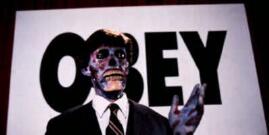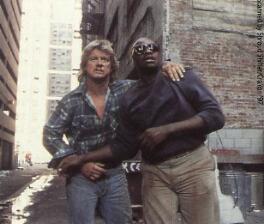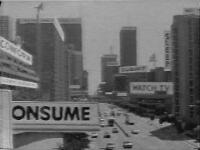Cinematic Pleasures: They Live
by j.d. lafrance
"I'm disgusted by what we've become in America. I truly believe there is brain death in this country." -- John Carpenter
 Filmmaker John Carpenter has always considered himself as an outsider in Hollywood. Like Sam Fuller before him, Carpenter makes genre films that are usually regarded by critics as simple thrill rides. However, underneath the surface lurks a strong, often savage social commentary on what Carpenter believes to be the problems that plague the United States. This approach is readily apparent in They Live (1988), a two-fisted science fiction film whose "premise is that the 'Reagan Revolution' is run by aliens from another galaxy" as Carpenter explained it in an interview. Admittedly, it's a pretty far out idea but the filmmaker makes it work with a film that is both exciting and thought-provoking.
Filmmaker John Carpenter has always considered himself as an outsider in Hollywood. Like Sam Fuller before him, Carpenter makes genre films that are usually regarded by critics as simple thrill rides. However, underneath the surface lurks a strong, often savage social commentary on what Carpenter believes to be the problems that plague the United States. This approach is readily apparent in They Live (1988), a two-fisted science fiction film whose "premise is that the 'Reagan Revolution' is run by aliens from another galaxy" as Carpenter explained it in an interview. Admittedly, it's a pretty far out idea but the filmmaker makes it work with a film that is both exciting and thought-provoking.
Nada (Roddy Piper) is a drifter, an amiable blue collar guy looking for steady work in Los Angeles. He eventually finds a job and befriends a fellow worker named Frank (Keith David), a man who is clearly tired of Capitalism ("The Golden Rule: He who has the gold makes the rules."). Nada is more optimistic. He believes in playing by the rules ("I deliver a hard day's work for my money, I just want the chance."). But this faith in the system begins to change when the squatter's camp the men are staying at is suddenly bulldozed by the police one night. At first, there seems to be no reason for this unprovoked attack but gradually, Nada begins to get some answers.
One day, while rummaging through some garbage, he comes across a pair of sunglasses that allow the viewer to see things as they really are: the world is seen in black and white where the colour facade disappears and billboards reveal their true messages: "OBEY," "MARRY AND REPRODUCE," and "SLEEP," while certain people turn out to be aliens in disguise. The glasses are a clever play on the notion of subliminal advertising and capitalism as the root of all evil. From this point, They Live kicks into high gear as Nada and Frank form an uneasy alliance and decide to stop this secret alien invasion.
The idea for They Live is based on two sources: a futuristic story, involving an alien invasion a la Invasion of the Body Snatchers (1955), called "Nada" from the Alien Encounters comic book. This story came from a short story called "Eight O'Clock in the Morning" by Ray Nelson that was originally published in The Magazine of Fantasy and Science Fiction in the '60s. Carpenter describes it as "a D.O.A. type of story. A fellow is put in a trance by a stage hypnotist. When he awakens, he realizes that the entire human race has been hypnotized. Amongst us are alien creatures who are controlling our lives. He has only until eight o'clock in the morning to solve the problem." Carpenter acquired the film rights to both the comic book and the short story and wrote the screenplay using Nelson's story as a basis for the film's structure.
The more political elements came from Carpenter's growing distaste with the ever-increasing commercialization of popular culture and politics. As he once remarked in an interview, "I began watching TV again. I quickly realized that everything we see is designed to sell us something...It's all about wanting us to buy something. The only thing they want to do is take our money." To this end, Carpenter thought of sunglasses as being the tool to seeing the truth, which "is seen in black and white. It's as if the aliens have colorized us. That means, of course, that Ted Turner is really a monster from outer space."
Since the screenplay was the product of so many sources: a short story, a comic book, and input from cast and crew, Carpenter decided to use the pseudonym, "Frank Armitage," a subtle allusion to one of the filmmaker's favourite writers, H.P. Lovecraft. Frank Armitage is in fact a character in Lovecraft's "The Dunwich Horror." Carpenter has always felt a close kinship with Lovecraft's worldview and his influence can be felt in other Carpenter films--most notably, The Thing (1982) and In The Mouth of Madness (1995). According to Carpenter, "Lovecraft wrote about the hidden world, the world underneath. His stories were about gods who are repressed, who were once on Earth and are now coming back. The world underneath has a great deal to do with They Live."
 After a budget around three million dollars was established, Carpenter began casting his film. For the crucial role of Nada, the filmmaker surprisingly cast wrestler "Rowdy" Roddy Piper whom he had met at Wrestlemania III. For Carpenter it was an easy choice: "Unlike most Hollywood actors, Roddy has life written all over him." Carpenter's gamble pays off as Piper does a fine job playing a everyman-type hero who, at first plays by the rules, but once he realizes that it's all a sham, decides to fight back. Piper's performance is not going to win any acting awards but it is a solid job that suits the film.
After a budget around three million dollars was established, Carpenter began casting his film. For the crucial role of Nada, the filmmaker surprisingly cast wrestler "Rowdy" Roddy Piper whom he had met at Wrestlemania III. For Carpenter it was an easy choice: "Unlike most Hollywood actors, Roddy has life written all over him." Carpenter's gamble pays off as Piper does a fine job playing a everyman-type hero who, at first plays by the rules, but once he realizes that it's all a sham, decides to fight back. Piper's performance is not going to win any acting awards but it is a solid job that suits the film.
Carpenter was impressed with Keith David's performance in The Thing and needed someone "who wouldn't be a traditional sidekick, but could hold his own." To this end, Carpenter wrote the role of Frank specifically for the underrated actor. David does a great job as the perfect foil for Piper. The two men have this intense relationship that oscillates between outright distrust and grudging respect.
This rather volatile alliance reaches critical mass in a wild, seven and half minute fist fight between the two men over a pair of the special sunglasses. The brawl starts off serious but eventually transforms into an absurd free-for-all. Carpenter remembers that the fight took three weeks to rehearse. "It was an incredibly brutal and funny fight, along the lines of the slugfest between John Wayne and Victor McLaglen in The Quiet Man."
One of the reasons why They Live works so well is the film's pacing. It starts off like the original Invasion of the Body Snatchers with the threat of alien invasion being implicit at first. Everything seems normal enough but after a half hour into the film, the threat suddenly becomes shockingly explicit when Nada puts on the sunglasses. From there, the film's pacing speeds up and They Live begins to incorporate action film sequences into its science fiction premise.
 And yet, throughout the film, there is always thought-provoking commentary. This is represented by the pirate TV broadcasts which, initially, seem like some lone conspiracy nut but eventually his ravings are revealed to be right on the money. His presence is the first sign that something is amiss. The television is presented as an electronic sedative in They Live. It's a drug to the masses. When the TV pirate appears, the mind-numbing routine is broken and people get headaches as a result.
And yet, throughout the film, there is always thought-provoking commentary. This is represented by the pirate TV broadcasts which, initially, seem like some lone conspiracy nut but eventually his ravings are revealed to be right on the money. His presence is the first sign that something is amiss. The television is presented as an electronic sedative in They Live. It's a drug to the masses. When the TV pirate appears, the mind-numbing routine is broken and people get headaches as a result.
When They Live was released in 1988, Carpenter had hoped that it would have the same effect as his film's TV pirate. Alas, it was not a commercial success. Carpenter sees the failure of his film as a result of "people who go to the movies in vast numbers these days [who] don't want to be enlightened." It's a shame because They Live is far from being an overtly preachy film. On the contrary, it is always exciting and entertaining first, and a scathingly social satire second.
However, Carpenter sees the real tragedy to be the lack of humanity in society. "The real threat is that we lose our humanity. We don't care any more about the homeless. We don't care about anything, as long as we make money." If They Live is about anything, it's a strong indictment against the capitalist greed that was so fashionable in the 1980s. It's sentiment that still exists now This makes Carpenter's film just as relevant today as it was then.
Copyright (c) 2005 erasing clouds |
|